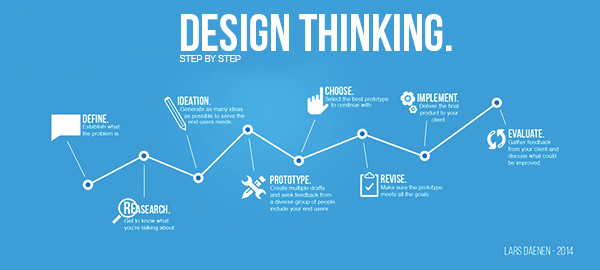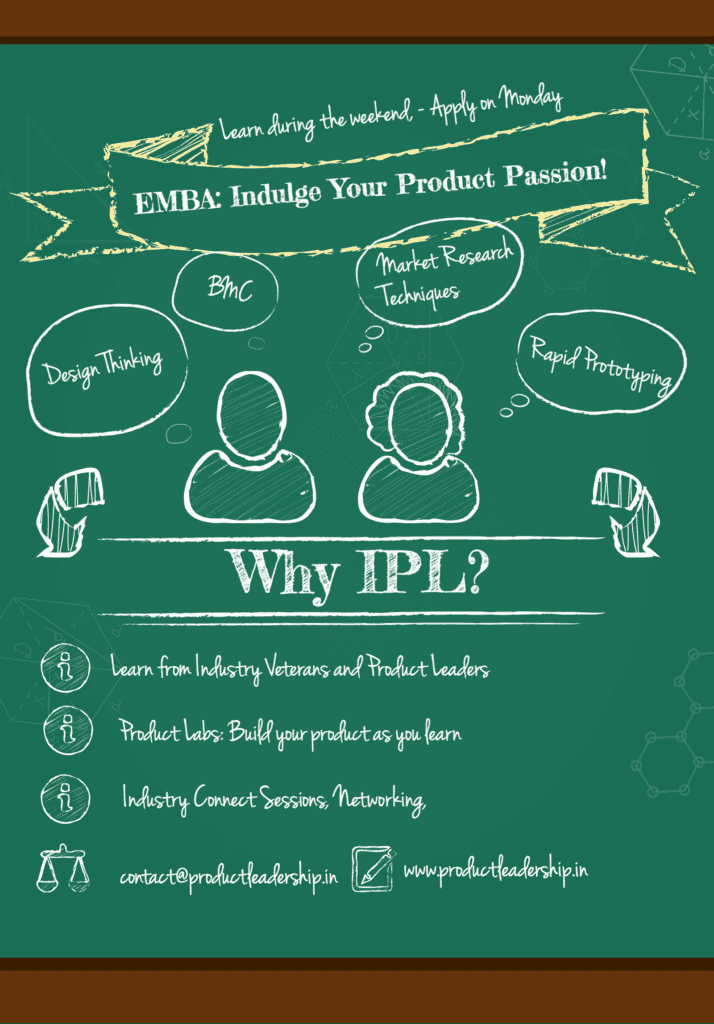6 Essential Product Concepts EMBA Students Learn During the Weekends and Implement On Monday
The Executive MBA (EMBA) program offered by the Institute of Product Leadership has been breaking new ground in the executive education space in India. In contrast to other general purpose MBAs, this EMBA is a purpose-built program for product professionals to enable them to become the product leaders of the future.
IPL’s EMBA classes run every alternate weekend for 18 months. That’s a pretty big time commitment for mid-career professionals, many of whom are on leadership tracks in their careers. This, besides the time spent on working on Product Labs, attending industry connect events and networking with their cohort and the alumni.
The Product Labs are a unique experience offered by IPL – a completely experiential, “learning by doing” business incubator that all students undergo through the lifetime of the program. Students start the program by registering their product idea and go through the gamut of exercises – from gaining customer insights via interviews to market research to minimum value proposition definition and beyond – to make the idea a reality. Many students go on to launch the products into the market, supported by IPL faculty and industry leaders.
This experiential learning has proven invaluable to students, as every concept they learn in class is immediately applied in the market context in Product Labs – a live demonstration of classroom learning. Translating this learning to workplace application becomes seamless come Monday.
Besides these long-term benefits of the EMBA experience, the weekend classes deliver some sharp “punches”. Students learn some cutting-edge concepts – jigsaw pieces that form part of the whole product innovation journey – that they can immediately apply at work on Monday.
Here’s a glimpse of some -
● The Business Model Canvas (BMC): A strategic tool that startups use to develop new businesses, the canvas has proven invaluable to scores of ventures, new and old, as they ideate and put together the building blocks of their business. The canvas’ template is useful to get a single view of key parts of the business such as the value proposition, partners, revenue streams, customer segments and so on.
EMBA go students through structured BMC-building sessions using real world problems. Defining the value proposition of a business, for example, is an in-depth exercise as product teams brainstorm to define what the core value their product is delivering to the customer and what customer needs they’re satisfying.
● Design Thinking: You’ve probably heard of this term among other “neo-product” terms such as growth hacking and clean tech. While design thinking is a fashionable buzzword in the media, it is a fact that companies across the globe are reaping the benefits of applying design thinking in their product development efforts.
IPL’s EMBA classes run every alternate weekend for 18 months. That’s a pretty big time commitment for mid-career professionals, many of whom are on leadership tracks in their careers. This, besides the time spent on working on Product Labs, attending industry connect events and networking with their cohort and the alumni.
The Product Labs are a unique experience offered by IPL – a completely experiential, “learning by doing” business incubator that all students undergo through the lifetime of the program. Students start the program by registering their product idea and go through the gamut of exercises – from gaining customer insights via interviews to market research to minimum value proposition definition and beyond – to make the idea a reality. Many students go on to launch the products into the market, supported by IPL faculty and industry leaders.
This experiential learning has proven invaluable to students, as every concept they learn in class is immediately applied in the market context in Product Labs – a live demonstration of classroom learning. Translating this learning to workplace application becomes seamless come Monday.
Besides these long-term benefits of the EMBA experience, the weekend classes deliver some sharp “punches”. Students learn some cutting-edge concepts – jigsaw pieces that form part of the whole product innovation journey – that they can immediately apply at work on Monday.
Here’s a glimpse of some -
● The Business Model Canvas (BMC): A strategic tool that startups use to develop new businesses, the canvas has proven invaluable to scores of ventures, new and old, as they ideate and put together the building blocks of their business. The canvas’ template is useful to get a single view of key parts of the business such as the value proposition, partners, revenue streams, customer segments and so on.
EMBA go students through structured BMC-building sessions using real world problems. Defining the value proposition of a business, for example, is an in-depth exercise as product teams brainstorm to define what the core value their product is delivering to the customer and what customer needs they’re satisfying.
● Design Thinking: You’ve probably heard of this term among other “neo-product” terms such as growth hacking and clean tech. While design thinking is a fashionable buzzword in the media, it is a fact that companies across the globe are reaping the benefits of applying design thinking in their product development efforts.

IPL’s students work with leading industry practitioners such as Prof. Mukesh Gupta of SAP to understand the nuances of Design Thinking. All learning is by doing at IPL, and so it is with Prof. Gupta, as he regularly puts all IPL cohorts through day-long sessions where they make sense of design thinking and create solutions to issues they face at work.
● Prototyping - Prototypes give product developers the chance to gain specific insights from their target user communities at minimal cost. They’re also invaluable tools that aid designers to improve usability, work towards a more viable product and to estimate costs. EMBA students are exposed to the art and science of prototyping and gain an invaluable skill – a skill that when applied at work, can help them bring diverse teams of engineering, marketing, sales and others to a common understanding.
● Value Proposition Definition – Articulating a compelling value proposition can often be the difference between a successful product and a failed one. However, arriving at a substantive value proposition is a tortuous exercise if not done right. It is critical for Product Managers to understand how to flesh out and define the value proposition of the solution they’re designing.
● Prototyping - Prototypes give product developers the chance to gain specific insights from their target user communities at minimal cost. They’re also invaluable tools that aid designers to improve usability, work towards a more viable product and to estimate costs. EMBA students are exposed to the art and science of prototyping and gain an invaluable skill – a skill that when applied at work, can help them bring diverse teams of engineering, marketing, sales and others to a common understanding.
● Value Proposition Definition – Articulating a compelling value proposition can often be the difference between a successful product and a failed one. However, arriving at a substantive value proposition is a tortuous exercise if not done right. It is critical for Product Managers to understand how to flesh out and define the value proposition of the solution they’re designing.

● Market Research Techniques - Once you’ve started the journey of defining your product idea better, knowing your market – your customers, competitors, enablers and other stakeholders – is imperative. There is a glut of information available nowadays, which makes it all the more essential to get a structured insight into the different techniques available to do market research.
● Financial Planning and Analysis – Product Managers almost always come from engineering backgrounds. Many “can’t be bothered” to learn the nuts and bolts of finance, as they’ve focused on applying all their time on complex engineering issues. However, every product owner is the CEO of his product, and needs to know the money side of the product’s business in order to succeed. IPL helps product managers get this essential grounding in business finance.
As mentioned earlier, these are individual pieces of a giant whole – anyone can read up on market research on the Internet, for example. But bringing it all together by working on the solution definition of a specific problem, while receiving constant feedback and mentoring from a real world, industry perspective makes the crucial difference.
The end result is a well-rounded product, and acquisition of the business leadership mindset essential for success. This is the value that the EMBA provides.
What skills do you think you need to pick to excel at your workplace? Talk to an IPL Counselor to explore if we can help you gain them.
● Financial Planning and Analysis – Product Managers almost always come from engineering backgrounds. Many “can’t be bothered” to learn the nuts and bolts of finance, as they’ve focused on applying all their time on complex engineering issues. However, every product owner is the CEO of his product, and needs to know the money side of the product’s business in order to succeed. IPL helps product managers get this essential grounding in business finance.
As mentioned earlier, these are individual pieces of a giant whole – anyone can read up on market research on the Internet, for example. But bringing it all together by working on the solution definition of a specific problem, while receiving constant feedback and mentoring from a real world, industry perspective makes the crucial difference.
The end result is a well-rounded product, and acquisition of the business leadership mindset essential for success. This is the value that the EMBA provides.
What skills do you think you need to pick to excel at your workplace? Talk to an IPL Counselor to explore if we can help you gain them.
Facebook
Twitter
LinkedIn
Tagged blogs




